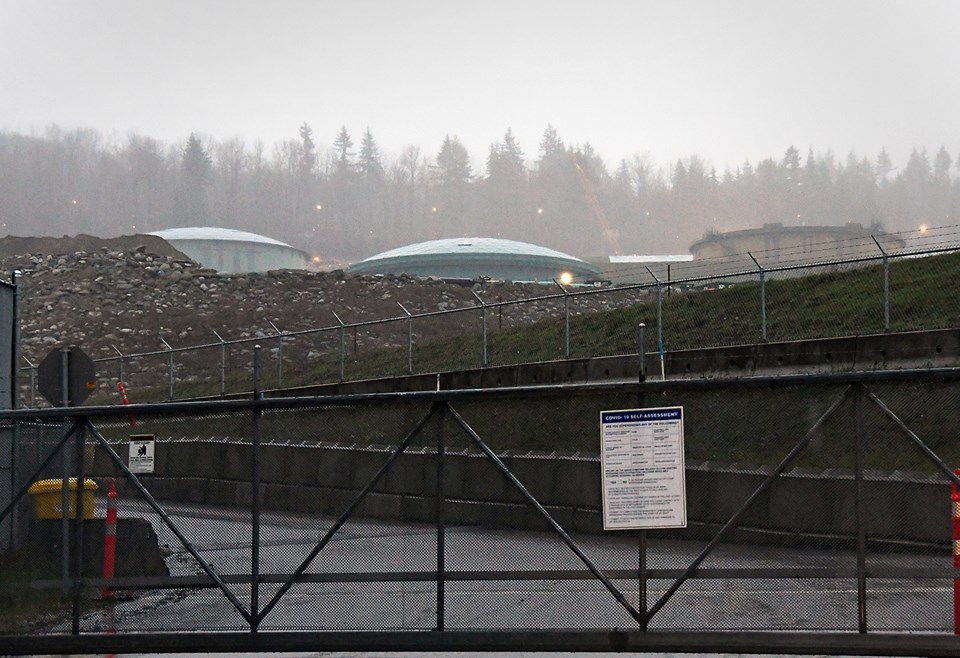Fire truck access to Trans Mountain’s tank facilities has become the latest battleground between the federally-owned pipeline and the City of Burnaby.
Trans Mountain filed a request to the Canada Energy Regulator earlier this month, asking for relief from certain Burnaby bylaws because it claims the city is being “unreasonable” and encroaching on the constitutional powers of the federal government, which has approved the pipeline expansion project.
The pipeline says the city wants fire truck access plans before it will grant the necessary building permits for the expansion of the Burnaby and Westridge Marine terminals.
Trans Mountain has submitted and repeatedly amended the plans as per the city’s request, it says, but the city has said they are still deficient in terms of access road width and turning radius.
Trans Mountain says its plans are “substantially compliant” with the building code, but some of the city’s requests can’t be implemented because of “site constraints.”
The company says it needs “timely relief” from the city’s bylaws to keep the project on track, noting each month of delay past the target in-service date of Dec. 31, 2022 will result in lost earnings of $100 million and millions of dollars in excess capital costs.
Trans Mountain argues Burnaby has been using its bylaws – including its tree bylaw – for years to delay the expansion project and the Canada Energy Regulator and its predecessor, the National Energy Board, have sided with the pipeline with four previous orders rendering the city’s bylaws inapplicable or inoperative.
“As the Project has already been determined to be in the public interest, there is no justification for further harm as a result of additional unnecessary and unreasonable permitting delays,” states the notice.
But the city says it’s Trans Mountain that’s holding up its own project.
“It is Trans Mountain’s failure to follow the fire services bylaw and building bylaw that has prevented the issuance of permits, and it is Trans Mountain resistance to following these city obligations that has led to any time delays,” states the city’s response by lawyer Greg McDade on Dec. 23.
McDade says the city “recognizes and accepts” the terminal projects have federal approval and the city isn’t allowed to make it impossible to get the necessary permits, but that’s not what’s happening here.
McDade says it wouldn’t be impossible for the company to comply, and Trans Mountain hasn’t provided any evidence to prove otherwise.
“That evidence is uniquely in the possession of the company, and without more, it is not reasonable to draw a conclusion of impossibility on mere assertions,” McDade states. “The standard on constitutional matters is high, and mere added expense or inconvenience is not sufficient.”
McDade also notes compliance in this case is “a matter of important public safety.”
“It would not be appropriate for the CER to use a constitutional argument to reduce safety standards for this project,” he said.
In an affidavit, Burnaby fire Chief Chris Bowcock says that, despite the fire department raising concerns from the very beginning, it was never consulted on the layout or design of the expanded tank facilities, and has never been provided with any detailed information about the “site constraints” that prevent Trans Mountain from adhering to the city’s fire services bylaw.
Bowcock says the bylaws governing fire truck access are “critically important.”
“The wider fire services bylaw fire lane and turning radius requirements are intended to ensure effective fire response efforts and the health and safety of fire and other emergency response personnel,” he says in his affidavit.
Trans Mountain notes the city is not responsible for responding to fires inside the tank farm, but Bowcock says there are “multiple potential tank fire scenarios within the terminals that would be unextinguishable due to lack of safe firefighting positions.”
He says the fire department could be called on to respond to emergencies both inside the tank facilities – including rescues and structure fires – and outside of them – including evacuations, wildland firefighting and monitoring toxic smoke.
“Given the significant mobilization of resources and personnel required by the Burnaby Fire Department in a fire emergency situation at either of the terminals, Trans Mountain’s failure to comply with critical and mandatory fire access standards would place the efficacy of Burnaby’s response efforts, as well as the efforts of other first responders and contractors, at risk, thereby increasing the likelihood of harm to the public and to firefighting personnel, first responders and facility staff,” Bowcock says.
Follow Cornelia Naylor on Twitter @CorNaylor
Email [email protected]


